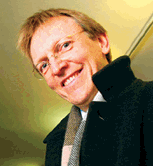 Can
the EC Overcome Almost Stultifying Bureaucracy to Have its Coming Multiyear
Funding Program Known as Framework 7 Work? (April 18, 2005)
Can
the EC Overcome Almost Stultifying Bureaucracy to Have its Coming Multiyear
Funding Program Known as Framework 7 Work? (April 18, 2005)
|
News & Views item - April 2005 |
![]()
 Can
the EC Overcome Almost Stultifying Bureaucracy to Have its Coming Multiyear
Funding Program Known as Framework 7 Work? (April 18, 2005)
Can
the EC Overcome Almost Stultifying Bureaucracy to Have its Coming Multiyear
Funding Program Known as Framework 7 Work? (April 18, 2005)
"This is not just another Framework program," Research Commissioner Janez Potočnik promised several times as he pitched the proposal to the European Parliament. "We want to do more."
For starters the funds requested for Framework 7 boosts yearly funding from just over €4 billion (A$6.75 billion) to more than €10 billion(A$16.9 billion) and with the promise of addressing the mountain of paperwork currently required to obtain Framework 6 funding. And according to Science's Gretchen Vogel "the plans to launch the long-desired European Research Council (ERC), a Europe-wide grantmaking body that will fund individual scientists instead of the large and often unwieldy collaborations supported by previous Framework programs" were particularly welcome.
On the other hand the promises to significantly reduce the time and effort needed to apply for funds, well, they've heard it all before. Another concern is the pending battle over the size of the European Union's budget as a whole. The size of the Framework's budget will be highly dependent on that outcome. In putting the case for scientific research the Research Commissioner intends to put the case to Europe's heads of government and finance ministers that the expanded Framework program is vital to keep Europe competitive in the face of an aging population and limited natural resources.
Perhaps Australia's Group of Eight, FASTS and the Australian Academies might want to learn what his arguments are. According to Philippe Busquin, Potočnik's immediate predecessor turned parliamentarian, their appears to be strong support from the European Parliament but its Europe's heads of government, who call the financial tune.
Vogel reports, "The €1.7 billion (A$2.9 billion) a year planned for the ERC is the result of an unprecedented grassroots movement initiated by scientists just 3 years ago. Fed up with the large projects that strangled their research in top-down bureaucracy, science leaders began calling for a European body more like the U.S. National Science Foundation or the National Institutes of Health.
"That dream came true more quickly than many of its architects expected. Busquin championed the idea, and the commission endorsed it last June. Although some worried that the Brussels Eurocrats would take a solid-gold idea and transmute it into lead, most soon came to realize that the efficient path went through the commission. 'There is no alternative' to having the commission involved, says Nowotny. 'The times are gone when there was no E.U., and you could set up [international physics lab] CERN with treaties between governments. If you tried to do that now, it would take 20 years.'
"[Currently] a five-member Identification Committee [is drawing] up a list of candidates for the 18-member governing council that will run the ERC... It promised to present its final list to the commission by June."
With the respect to Framework 7 as a whole it's now the turn of the European Parliament to put in its two-penn'eth worth and if Framework 6 is any indication they're gonna have a lot of amendments to put forward. All in all it may well be a year before a final version is hammered out.
But there is real optimism within the scientific community, "The change in atmosphere in the last 2 or 3 years is just incredible," says geneticist Kai Simons, a director of the Max Planck Institute for Molecular Cell Biology and Genetics in Dresden. And Vogel reports that Simons told her he believes the commission has become more open, but even more important is the fact that scientists have begun to make themselves heard in Brussels and are seeing real results: "Everyone realizes there are going to be real benefits from this. For the first time, they see a hope."